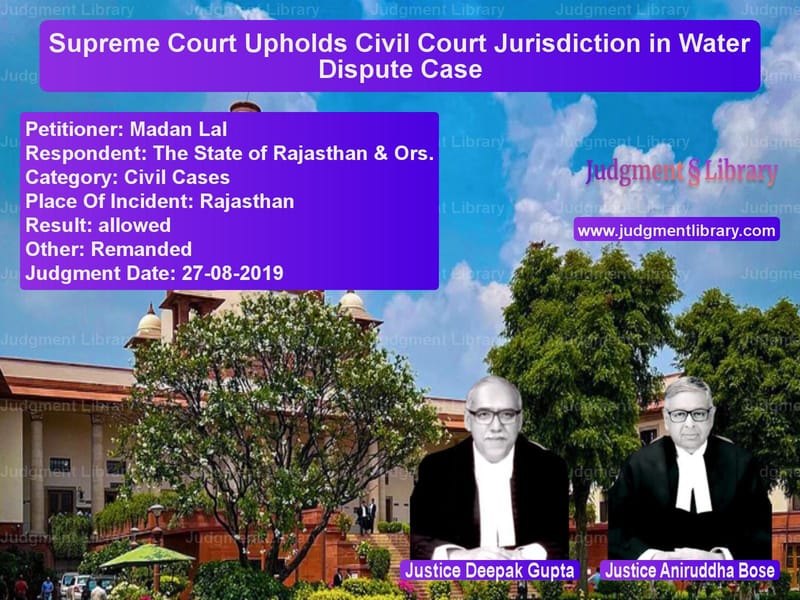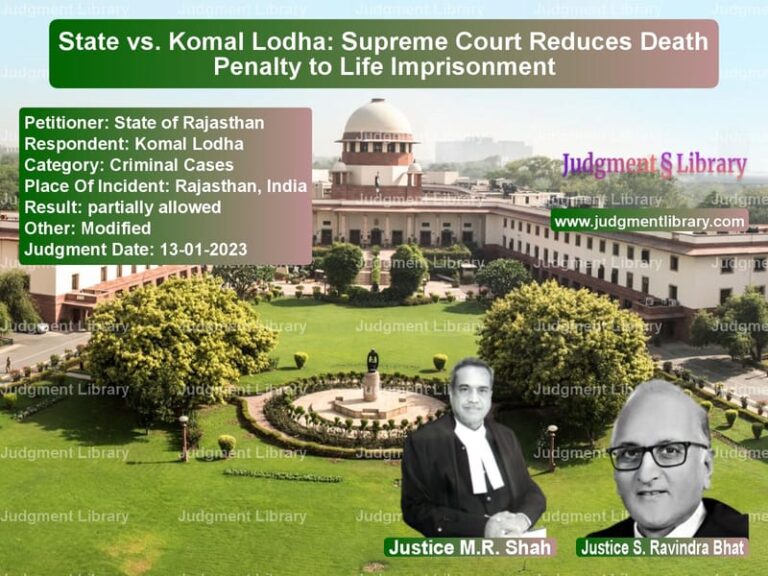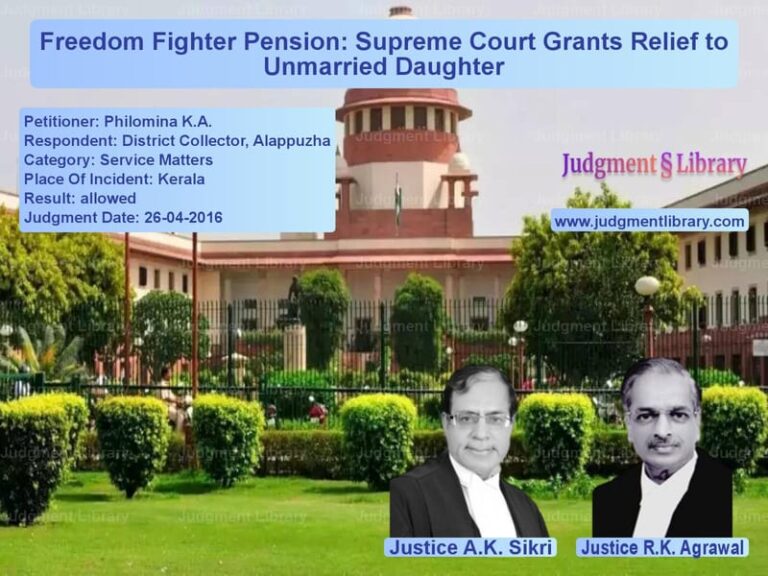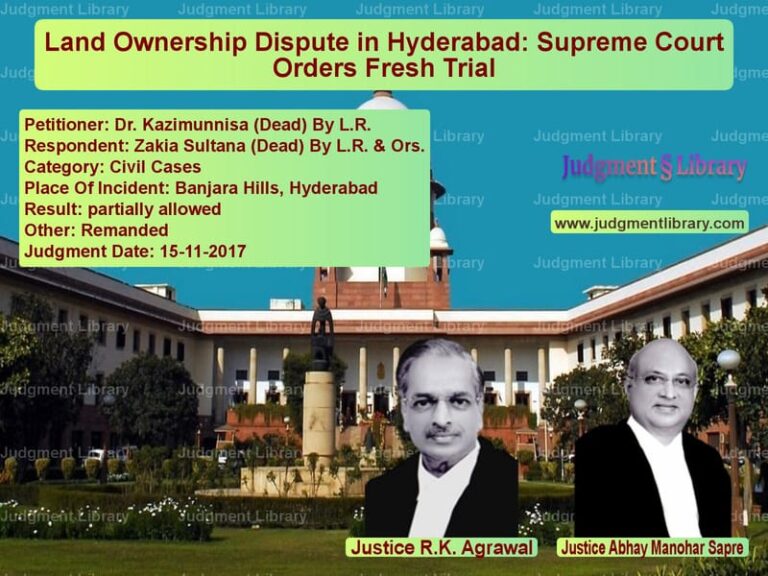Supreme Court Upholds Civil Court Jurisdiction in Water Dispute Case
The case of Madan Lal vs. The State of Rajasthan & Ors. revolves around a water dispute concerning the distribution and use of irrigation water under the Rajasthan Irrigation and Drainage Act, 1954. The Supreme Court, in its judgment dated 27th August 2019, ruled in favor of the appellant, setting aside the Rajasthan High Court’s decision, which had denied the jurisdiction of civil courts in such matters.
Background of the Case
The dispute arose when the appellant, Madan Lal, and the private respondents had a disagreement regarding the distribution of irrigation water. The matter was initially taken to the competent authorities under the Rajasthan Irrigation and Drainage Act, 1954, where the appellant lost the case.
Following the unfavorable ruling by the irrigation authorities, the appellant filed a civil suit challenging the decision. The suit was dismissed by the Trial Court. The appellant then filed an appeal before the First Appellate Court, which ruled in his favor. However, the private respondents challenged this decision before the Rajasthan High Court.
The High Court, in its ruling, held that the civil courts had no jurisdiction in such matters and reversed the decision of the First Appellate Court, thereby reinstating the ruling of the Trial Court.
Key Issues in Dispute
- Whether civil courts have jurisdiction to hear disputes related to the distribution and use of irrigation water.
- Whether the Rajasthan Irrigation and Drainage Act, 1954, bars civil court intervention.
- Interpretation of Section 53 of the Rajasthan Irrigation and Drainage Act, 1954.
Arguments by the Petitioner (Madan Lal)
- The petitioner argued that under Section 53(2) of the Rajasthan Irrigation and Drainage Act, decisions made by irrigation authorities are final only for the crop currently sown but can be reviewed by civil courts.
- The civil courts retain jurisdiction to adjudicate disputes over irrigation rights and liabilities beyond the scope of temporary irrigation rulings.
- The High Court misinterpreted the law by denying civil court intervention, leading to a miscarriage of justice.
Arguments by the Respondents
- The respondents contended that once an irrigation authority has ruled on a water dispute, the decision should be treated as final and binding.
- The civil court’s involvement in such matters undermines the administrative authority of irrigation officials.
- The High Court correctly determined that the civil courts had no jurisdiction over the matter.
Supreme Court’s Observations
The Supreme Court examined Section 53 of the Rajasthan Irrigation and Drainage Act, which states:
“Whenever a difference arises between two or more persons in regard to their mutual rights or liabilities in respect of the use, construction, or maintenance of a water course, any such person may apply in writing to the Divisional Irrigation Officer stating the matter in dispute… Such order shall be final as to the use or distribution of water for any crop sown or growing at the time when such order is made and shall thereafter remain in force until set aside by the decree in a Civil Court.”
1. Interpretation of Section 53
The Court emphasized that the wording of Section 53(2) explicitly allows for civil court intervention after the immediate dispute over a particular crop is resolved:
“The Civil Court has jurisdiction to entertain and decide such a dispute. The only caveat is that the Civil Court shall not pass any order in respect of crops sown or growing in the land at the time of passing of the order.”
2. High Court’s Misinterpretation
The Supreme Court found that the High Court had erred in holding that civil courts had no jurisdiction:
“The High Court fell in error while holding that the Civil Court could not have set aside the suit. On this ground, we feel that the judgment of the High Court requires to be set aside.”
3. Right to Judicial Review
The Court reiterated that statutory bodies cannot completely oust civil court jurisdiction unless explicitly provided by law. In this case, the Act itself acknowledges civil court authority beyond the immediate irrigation season.
Final Verdict
- The Supreme Court set aside the Rajasthan High Court’s decision.
- The matter was remanded to the High Court for a decision on merits.
- The Court clarified that civil courts have jurisdiction to review irrigation disputes beyond the season of the affected crop.
Implications of the Judgment
- Reaffirms that civil courts retain jurisdiction in matters not explicitly barred by law.
- Ensures that farmers and landowners can seek judicial review of irrigation decisions beyond immediate seasonal disputes.
- Prevents the misuse of administrative decisions by irrigation authorities to permanently alter water rights.
Conclusion
The Supreme Court’s ruling in this case is a significant affirmation of the role of civil courts in upholding justice in irrigation disputes. By setting aside the High Court’s erroneous decision, the judgment safeguards the right of individuals to seek judicial review of administrative rulings, ensuring that irrigation authorities do not have unchecked power over landowners and farmers.
Petitioner Name: Madan Lal.Respondent Name: The State of Rajasthan & Ors..Judgment By: Justice Deepak Gupta, Justice Aniruddha Bose.Place Of Incident: Rajasthan.Judgment Date: 27-08-2019.
Don’t miss out on the full details! Download the complete judgment in PDF format below and gain valuable insights instantly!
Download Judgment: Madan Lal vs The State of Rajasth Supreme Court of India Judgment Dated 27-08-2019.pdf
Direct Downlaod Judgment: Direct downlaod this Judgment
See all petitions in Property Disputes
See all petitions in Judgment by Deepak Gupta
See all petitions in Judgment by Aniruddha Bose
See all petitions in allowed
See all petitions in Remanded
See all petitions in supreme court of India judgments August 2019
See all petitions in 2019 judgments
See all posts in Civil Cases Category
See all allowed petitions in Civil Cases Category
See all Dismissed petitions in Civil Cases Category
See all partially allowed petitions in Civil Cases Category







